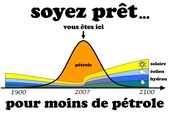And the gas race has already revealed its weaknesses: exploration and exploitation of drilling in the Arctic Ocean (the guys are happy that the ice has melted there!), Europe's almost total dependence on Russia for the gas (me, it doesn't tempt me more than that), deterioration of still intact natural areas (shale gas, oil sands, etc.), more ferocious martial chessboard for the theft of resources by force, etc.
In Europe, we should seriously consider the alternatives in favor of our autonomy because we no longer have enough coal (and so much the better) and the only oil zone (in the Channel) is dry (and so much the better) of gas as oil.
In view of the report initiating this thread, the speed at which these resources are used and the slowness of setting up less energy-consuming alternatives, I do not find this scenario so excessive. Obviously, the world is waiting for the last drop of oil before reacting rather than starting to do without it ... drop by drop.




